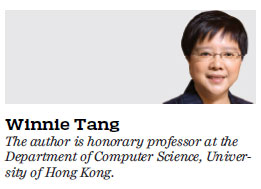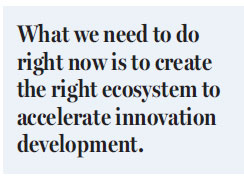HK in a strong position to become global AI leader
Updated: 2018-07-24 08:07
(HK Edition)
|
|||||||||
Tesla Chief Executive Elon Musk recently admitted his overestimation of his car plants' robotic and automated capabilities had led to a lower-than-expected vehicle production.
We might anticipate that it would be difficult for an artificial intelligence robot to shuttle and assemble a piece of furniture the way human beings do.
But the April issue of Science Robotics told us that a team at Nanyang Technological University in Singapore successfully assembled a wooden chair with an IkeaBot. The robot has two robotic arms and a stereo camera. After receiving assembly instructions, it first observed the environment before beginning to work. At first, the robotic arms were awkward and clumsy, and the parts were not firmly grasped. After groping for a while though, the robotic arms were able to complete the task smoothly. This took more than 20 minutes. In the process of interaction, the two arms cooperated with each other without colliding.
This is a breakthrough for Al; the robot can learn actions on its own and flexibly use its limbs. It is an important step for robots to evolve toward human capability.

Today, AI is widely regarded as a key driver for future economic development. But talent is crucial to further AI development. The surge in demand for AI talent has created a huge talent shortage. A Canadian startup estimated that there were only about 90,000 AI talents in English-speaking countries. The Global AI Talent White Paper released by the Tencent Research Institute last December noted that there were about 300,000 AI talents in the world, whereas the market demand is in terms of millions. The number of graduates per year in related disciplines is only 20,000. This is far from sufficient to meet demand.
As AI talent is in short supply, AI professionals have been offered generous remunerations. The New York Times reported that based on information disclosed by non-profit research organization OpenAI, Ilya Sutskever, a senior researcher head hunted from Google, had an annual salary of more than $1.9 million in 2016. OpenAI had only 52 employees when it was founded in 2016 but spent over $7 million on employee compensation and benefits.
At the same time, the newspaper quoted industry insiders as saying that even for an AI professional lacking business experience, the annual salary together with stock options would be generally worth of between $300,000 and $500,000. On the other hand, Baidu's Young Talent Program designed to cultivate outstanding scientists under 30 offers an annual salary not less than 1 million yuan($147,000) to prospective candidates.
Al jobs are well-paid and offer a promising future to the right candidates. Can people in Hong Kong have a share?
Our higher education has been well-known for its quality. Lecturers and students have long been recruitment targets. For example, Tencent and Hong Kong University of Science and Technology jointly established a laboratory for AI in 2015; Baidu recruited interns from the Chinese University of Hong Kong, the University of Hong Kong and HKUST earlier this year; HKU and Alibaba jointly set up an AI institute in Hangzhou four years ago. HKUST is the first Asian institute invited to join the Partnership on AI, an international organization founded by technology giants such as Amazon, Google, Facebook and Microsoft to explore the development of AI with internationally renowned universities such as Princeton University and the University of Oxford.

Local universities' achievements in AI research have also been well recognized. According to statistics from Scopus, the world's largest index summary database, the H-index (publication influence and impact) of AI theses from Hong Kong tertiary institutions were ranked No 10 in the world. Three Hong Kong universities have been ranked among the top-100 AI organizations which include Microsoft and Google, as revealed by Nikkei Asian Review.
Not only have Hong Kong universities achieved remarkable research results, they are also in a leading position in terms of result applications. For example, CUHK in 2014 developed an automatic facial-recognition system with an accuracy rate of over 99 percent - the world's most accurate. Another research team has successfully applied AI in interpreting X-ray images to diagnose lung cancer and breast cancer last year, helping to increase the accuracy rate of clinical diagnosis to 90 percent. Hong Kong's SenseTime is also a leader in its field. With its original AI technology, it has become a famous unicorn (valued at no less than $1 billion) in just three years. It has set up a joint laboratory with CUHK and has contributed the most AI-related papers among Asian economies to the world's top visual academic conferences such as CVPR and ICCP. It even surpassed many tech giants such as Google and Facebook.
The Hong Kong government has invested a lot of resources into promoting R&D and set a blueprint for development. This includes construction of an "AI and robotic technology innovation platform" to provide funding to institutions that engage in R&D of AI. Government support is crucial to Hong Kong's continuous development of advanced technologies.
Hong Kong's achievements in AI development have surprised many. While the city still has less than a handful of unicorns today, it has the potential to become an inno-tech hub like Silicon Valley, thanks to the advantages it enjoys. This includes excellent human capital, being part of the Guangdong-Hong Kong-Macao Greater Bay Area and the strong support of the central government to become an inno-tech hub. What we need to do right now is to create the right ecosystem to accelerate innovation development.
(HK Edition 07/24/2018 page7)